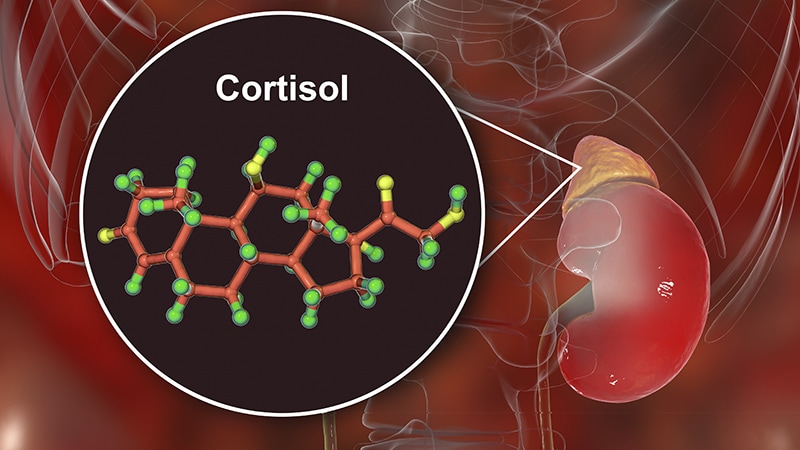Glucocorticoid Abnormalities Boost Infections
Researchers published the study covered in this summary on medRxiv.org as a preprint that has not yet been peer reviewed.
Key Takeaways
-
The newly derived Infections in Patients With Endocrinopathies (ICARO) questionnaire is a patient self-report tool that showed promise in clinical testing as a simple and cost-effective way to identify patients at increased risk for infections and evaluate the effect of specific treatments on infection susceptibility.
-
The questionnaire demonstrated its ability to investigate the epidemiology of the most common infections experienced by patients with endogenous hypercortisolism (excluding ectopic Cushing syndrome), adrenal incidentalomas, and possible autonomous cortisol secretion, and both primary and secondary adrenal insufficiency. Importantly, the ICARO questionnaire is relevant for infections that do not result in hospitalization or death.
Why This Matters
-
ICARO is the first objective tool to quantify the burden of infectious disease in endocrine patients, the authors say.
-
Researchers developed and adapted the ICARO questionnaire specifically for outpatients, and they believe it is a potentially useful tool for future studies that explore the relationships between infection type and severity, hormone levels, and treatment of glucocorticoid disorders.
Study Design
-
From January 2018 to June 2019, the researchers developed the 30-item questionnaire that collects information on infections that occurred during the preceding 12 months, and they administered it to 780 qualifying, consecutive participants who were 18 to 80 years old and sought care at endocrinology outpatient clinics at any of three hospitals in Rome and one in Naples, Italy.
-
The study group included 210 people with glucocorticoid disorders: 75 with endogenous hypercortisolism (43 with overt Cushing syndrome and 32 with possible autonomous cortisol secretion) and 135 with endogenous hypocortisolism.
-
The study also included 570 controls: consecutive patients attending the outpatient clinics for nonfunctioning adrenal adenomas, nonfunctioning pituitary adenomas without pituitary insufficiency, microprolactinomas, thyroid nodules, treated hypothyroidism, or well-controlled diabetes.
-
Researchers modeled the ICARO questionnaire on the German National Cohort Questionnaire.
Key Results
-
Results from multivariate logistic regression analysis showed that during the year preceding the questionnaire and after corrections for age, diabetes, obesity, menopause/hypogonadism, and sex — compared with the controls — patients with hypercortisolism had 2.3-fold higher odds of developing lower respiratory tract infections, a 3.3-fold higher rate of developing mycosis, a 4.1-fold increased rate of developing upper respiratory tract infections, and a 2.9-fold higher rate of developing influenza infections.
-
A similarly adjusted multivariate regression analysis showed that compared with controls during the preceding year the patients with hypocortisolism had a 2.2-fold higher rate of developing frequent gastrointestinal infections, a 2.3-fold higher rate of developing mycosis, and a 2.5-fold higher rate of developing urinary tract infections.
Limitations
-
Because the data collected by the ICARO questionnaire was all self-reported the authors recommend caution when interpreting the results because they could include a recall bias. However, a study of a prior version of the questionnaire revealed minimal recall bias. In addition, the authors note that the patients who participated in the study are accustomed to answering questions about their condition and symptoms.
-
Certain baseline characteristics of people in the hypercortisolism group produced some biases, a byproduct of the observational nature of the study and characteristics of hypercortisolism. Compared with the control patients, this cohort had a high number of women, as well as people with diabetes and with obesity. In addition, those with possible autonomous cortisol secretion were in general older than the controls. To address these biases, the researchers adjusted their findings for the main confounders that predispose people to infections: age, sex, diabetes, menopause, hypogonadism, and obesity. They also performed a sensitivity analysis that excluded those with either obesity or diabetes.
Disclosures
-
The study received no commercial funding.
-
None of the authors had disclosures.
This is a summary of a preprint research study, “Susceptibility and characteristics of infections in patients with glucocorticoid excess or insufficiency: The ICARO tool,” written by researchers from any of four institutions in Italy on medRxiv provided to you by Medscape. This study has not yet been peer reviewed. The full text of the study can be found on medRxiv.org.
Source: Read Full Article
